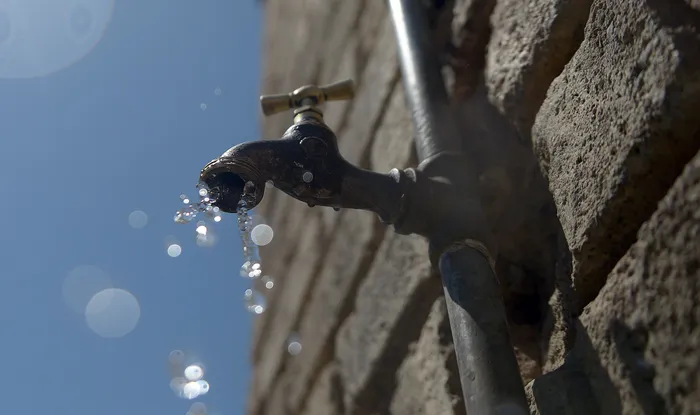The water, energy, food nexus: A catalyst for equitable growth and resilient futures
WATER MANAGEMENT

As urban centres like Johannesburg grapple with soaring populations and increasing demand, the strained infrastructure leads to severe water shortages, with communities experiencing days without reliable access to water, says the author.
Image: Oupa Mokoena / Independent Newspapers
The interdependence of water, energy, and food systems is crucial for securing essential services, fostering economic growth, and protecting vulnerable communities. This nexus is particularly significant in South Africa and the broader Global South, where water scarcity, energy instability, and food insecurity are deeply interconnected issues, each exacerbating the others.
Extreme weather events linked to climate change are rendering water scarcer and more unpredictable, according to the United Nations. Unreliable power sources compromise sanitation processes, resulting in untreated sewage contaminating water bodies and increasing water purification costs for service providers. Consequently, water pollution poses significant risks to human health, contributing to waterborne illnesses and severely impacting ecosystems, as toxic elements enter the human food chain through contaminated fish and aquatic organisms.
Municipalities’ consistent failure to maintain and expand energy and water infrastructure has fostered a multifaceted crisis that threatens water, energy, and food security across South Africa. This neglect jeopardises the availability and quality of essential resources and undermines the fundamental right to water enshrined in the South African Constitution.
As urban centres like Johannesburg face soaring populations and demand, strained infrastructure results in significant water shortages, with communities experiencing days without reliable access. Compounding this distress is the inconsistent energy supply, disrupting daily life and economic activities. Farmers struggle with unreliable irrigation, leading to declines in agricultural productivity, food security, and rising consumer prices. Vulnerable communities, already dealing with socio-economic disadvantages, bear the brunt of these challenges, deepening inequalities and hindering opportunities for growth and development.
Local governments must prioritise substantial investments in infrastructure development and maintenance. This approach will ensure equitable access to vital resources, safeguard constitutional rights, and pave the way for a more sustainable and resilient future. The urgency of these challenges grows more pronounced and irreversible, underscoring the need for immediate action.
Energy, Water & Food: The Equitable Impacts
The frequent occurrence of energy shortages severely disrupts water delivery systems, resulting in inefficiencies that compromise public health and agricultural productivity. Research consistently shows that power outages at essential water pumps and treatment facilities degrade service quality, thereby jeopardising public health, agricultural yields, and economic activity.
Agriculture, which consumes over 70% of South Africa's freshwater resources, is particularly reliant on both water and energy. Studies examining the food-energy-water nexus across Africa reveal that efficient irrigation technologies, such as solar-powered drip irrigation, can significantly enhance agricultural yields. These advancements not only improve incomes and nutrition but also strengthen climate resilience in the face of changing environmental conditions.
The convergence of the water-energy-food nexus acts as a powerful stimulus for local economies. Initiatives like pumped-storage hydropower schemes in Southern Africa provide reliable base-load power while ensuring a stable irrigation water supply, creating crucial job opportunities in technical and maintenance roles that benefit rural communities. Furthermore, various solar water pump programs across Africa have demonstrated success, provided thousands of jobs while ensuring resilient access to water resources, which contribute to poverty alleviation and sustainable development.
Global South Case Studies: Evidence in Action
Morocco’s Integrated Approach
Morocco showcases an innovative strategy that integrates desalination plants, dam reservoirs, agricultural policies, and a vast renewable energy pipeline. This comprehensive framework addresses the intertwined challenges of water scarcity and energy availability, positioning Morocco as a leader in sustainable resource management.
The nation has invested in solar energy projects, enabling the operation of desalination plants and water-efficient irrigation systems, which support agricultural productivity even in arid regions. By implementing policies that promote sustainable farming practices, Morocco not only boosts food security but also enhances resilience against climate-related challenges.
South Africa’s Renewable Energy Initiatives
In South Africa, initiatives such as the Renewable Energy Independent Power Producer Procurement Program (REIPPPP) demonstrate a commitment to integrating renewable energy and enhancing water security. By investing in solar and wind technologies, this initiative aims to diversify energy sources while minimising reliance on unstable power grids.
Moreover, projects that focus on harnessing biogas from agricultural waste for energy generation serve a dual purpose: they provide energy while also reducing waste. This approach enhances the sustainability of both food and energy systems, demonstrating how innovative solutions can yield multiple benefits for communities.
Conclusion
Addressing the interconnected challenges of water, energy, and food systems is vital for driving equitable growth and building resilient futures for all communities. By adopting integrated strategies, investing in sustainable technologies, and prioritising infrastructure improvements, we can harness the potential of the nexus to create sustainable pathways for development. Collaborative efforts and innovative solutions are crucial to empowering vulnerable communities, upholding human rights, and ensuring a more sustainable future in South Africa and the broader Global South.
* Ramateu Monyokolo, chairperson of Association of Water and Sanitation Institutions of South Africa (AWSISA) and Rand Water.
** The views expressed here do not necessarily represent those of Independent Media or IOL.
BUSINESS REPORT